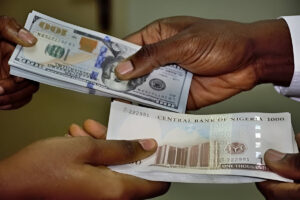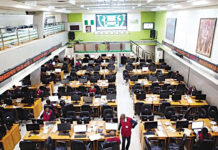On Thursday, August 22, 2024, the Nigerian Naira appreciated to N1,600 per dollar in the parallel market, a notable improvement from N1,615 the previous day. This rise in value reflects ongoing fluctuations in the currency exchange landscape as the Naira continues to respond to various economic factors.

However, the Naira experienced a different trend in the Nigerian Autonomous Foreign Exchange Market (NAFEM), where it depreciated to N1,586.11 per dollar. This represents a decline from N1,543.84 per dollar on Wednesday, indicating a depreciation of ₦42.27. The contrasting movements between the parallel market and NAFEM highlight the complexities of Nigeria’s foreign exchange environment.
The volume of dollars traded in NAFEM also saw a significant drop, with turnover falling by 30 per cent to $120.2 million, down from $171.79 million the day before. This decrease in trading volume may suggest reduced demand or liquidity in the market, which can further impact exchange rates.
As a result of these changes, the margin between the parallel market rate and the NAFEM rate narrowed to ₦13.89 per dollar, a significant reduction from ₦71.16 the previous day. This narrowing margin indicates a convergence of rates, which could be a sign of increasing stability in the currency market.
The fluctuations in the Naira’s value are influenced by various factors, including supply and demand dynamics, interest rates, and overall economic conditions. Investors and market participants closely monitor these rates as they provide insights into the health of the Nigerian economy and the currency’s performance.
The recent appreciation of the Naira in the parallel market may offer some relief to individuals and businesses needing foreign currency for transactions. However, the depreciation in the official NAFEM market raises concerns about the overall stability of the Naira and the challenges facing the Nigerian economy.
As the situation evolves, stakeholders will be watching closely to see how these exchange rate movements impact trade, investment, and the daily lives of Nigerians. The Central Bank of Nigeria (CBN) continues to implement measures aimed at stabilizing the Naira and ensuring a more predictable foreign exchange environment.
Naira’s rise to N1,600 per dollar in the parallel market reflects ongoing volatility in Nigeria’s currency exchange landscape. While this appreciation may provide some short-term benefits, the depreciation in the official market underscores the need for continued monitoring and effective economic policies to support the Naira’s long-term stability.




